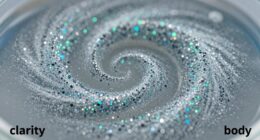Decaf coffee lets you enjoy the flavor and benefits of coffee while cutting caffeine, which helps prevent jitters and sleep issues. It still offers many antioxidants, though slightly fewer than regular coffee, because the decaffeination process can reduce some nutrients. Regular coffee has more caffeine and antioxidant levels but may cause jitters or interfere with sleep. To find out which suits your health goals better, consider all the benefits and drawbacks discussed here.
Key Takeaways
- Decaf coffee contains significantly less caffeine, making it suitable for sensitive individuals or those avoiding caffeine late in the day.
- Both decaf and regular coffee are rich in antioxidants, though decaf may have slightly lower levels due to the decaffeination process.
- The decaffeination process can marginally reduce antioxidant content, but decaf still offers notable health benefits.
- Decaf is ideal for people with heart issues or anxiety, providing coffee’s benefits without stimulating side effects.
- Regular coffee typically has higher antioxidant levels, but decaf remains a healthy choice for caffeine-sensitive consumers.

Many people enjoy drinking coffee, but they often wonder whether decaf or regular coffee is the better choice. If you’re sensitive to caffeine or trying to cut back, decaf might seem like the obvious option. The main appeal of decaf is caffeine reduction, which helps prevent jitters, insomnia, and other side effects linked to high caffeine intake. However, you might be curious about how decaffeination affects the health benefits you associate with coffee, especially regarding antioxidant levels. Coffee is rich in antioxidants, which help combat oxidative stress and support overall health. Some studies suggest that decaffeinated coffee retains many of these antioxidants, but others indicate that the levels could be slightly lower compared to regular coffee. The exact difference depends on the decaffeination process used, but generally, decaf still offers a substantial antioxidant punch.
When you choose decaf, you’re reducing your caffeine intake without sacrificing many of coffee’s beneficial properties. This makes decaf a good choice if you’re prone to anxiety, have heart issues, or simply prefer to avoid caffeine late in the day. It’s also helpful for those who want to enjoy the flavor and ritual of coffee without disrupting sleep. But it’s important to recognize that decaf isn’t completely free of caffeine; most decaf coffees contain about 2 to 15 milligrams per serving, compared to around 70 to 140 milligrams in regular coffee. So, if your goal is complete caffeine avoidance, carefully checking labels and brewing methods is wise.
In terms of antioxidant levels, research indicates that decaf coffee still provides a significant amount of antioxidants, such as chlorogenic acids, which contribute to its health benefits. Some studies show that the decaffeination process can slightly reduce these compounds, but not enough to negate the health advantages. That said, regular coffee tends to have a slight edge in antioxidant content, given its higher caffeine levels, which may correlate with increased antioxidant capacity. But the difference isn’t drastic enough to dismiss decaf as a healthy alternative. If you’re looking for a way to enjoy coffee’s benefits while minimizing caffeine’s effects, decaf is a practical option. It allows you to indulge in coffee’s rich flavors and antioxidants without the jitters or sleep disruptions, making it a popular choice among health-conscious coffee drinkers.
Ultimately, whether you opt for decaf or regular coffee depends on your health priorities and caffeine sensitivity. Both types offer antioxidant benefits, but decaf provides the added advantage of reduced caffeine, helping you enjoy your favorite beverage without compromising your well-being.
Frequently Asked Questions
Does Decaf Still Contain Caffeine?
Yes, decaf still contains some caffeine, but the amount varies depending on decaffeination methods used. Typically, decaf has about 2-5 milligrams of caffeine per cup, compared to 70-140 milligrams in regular coffee. Caffeine content variations happen because different decaffeination processes like Swiss water or chemical methods remove caffeine differently. So, if you’re sensitive to caffeine, check the label for exact amounts, but expect a significant reduction.
How Is Decaf Coffee Processed?
You might wonder how decaf coffee is processed. During coffee extraction, decaffeination methods like solvent-based, water, or supercritical carbon dioxide techniques remove most caffeine. These methods differ in how they target caffeine molecules, ensuring the beans retain flavor while reducing caffeine content. You’ll notice that decaf undergoes careful extraction to preserve taste, making it a popular choice for those avoiding caffeine but still craving coffee’s rich flavor.
Can Decaf Coffee Cause Allergies?
Think of decaf coffee as a quiet harbor—generally safe but occasionally harboring hidden storms. If you’re pollen sensitive or have food allergies, decaf might still trigger reactions due to residual proteins or contaminants. While rare, some people develop allergies to decaf’s processing chemicals or additives. Always check labels and consult with your doctor if you notice symptoms after drinking decaf coffee, as individual sensitivities vary.
Is Decaf Coffee Suitable for Pregnant Women?
You might wonder if decaf coffee is safe during pregnancy. Generally, it’s a good choice because it contains less caffeine, aligning with pregnancy safety guidelines and caffeine restrictions. However, you should still consume it in moderation, as some decaf varieties may have trace amounts of caffeine. Always check with your healthcare provider to confirm it fits your specific pregnancy needs and safety requirements.
Does Decaf Coffee Have the Same Antioxidants as Regular?
You might wonder if decaf coffee has the same antioxidant levels as regular coffee. While decaf does contain antioxidants, the amount can be slightly lower due to the decaffeination process. This difference could have minor health implications, especially if you’re counting on antioxidants for their health benefits. However, decaf still offers some antioxidants, making it a reasonable choice if you want to reduce caffeine intake without losing all the potential health perks.
Conclusion
Whether you choose decaf or regular coffee, your decision impacts your health, your energy, and your enjoyment. Both offer unique benefits and drawbacks, so consider what matters most to you—whether it’s reducing caffeine or savoring the full flavor. By understanding their differences, you can make informed choices, align your coffee habits with your lifestyle, and truly enjoy each cup. Ultimately, it’s about balancing pleasure with wellness, sip by sip, moment by moment.









